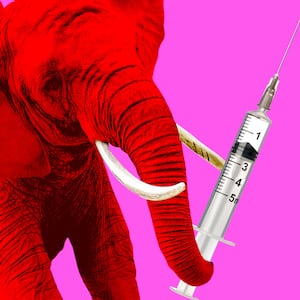On Tuesday evening, former President Donald Trump made an appearance on Fox News to complain about not getting enough credit for the development of the coronavirus vaccine—and to urge his vaccine-skeptical supporters to get inoculated.
“When you go to the COVID issue, we did a great job. We get very little credit for it,” Trump griped to Fox News Primetime host Maria Bartiromo, before encouraging the network’s viewers to take the coronavirus shot. “I would recommend it and I would recommend it to a lot of people that don’t want to get it, and a lot of those people voted for me, frankly... But it is a great vaccine. It is a safe vaccine and it is something that works.”
The appeal to his cult following by the ex-president—who was secretly vaccinated before he had to be nearly dragged out of the White House in January—comes after numerous surveys finding white Republicans are the group most likely to refuse getting the coronavirus injection.
For months, a staggering amount of digital ink was spilled about Black wariness toward the COVID-19 vaccine due to fears engendered by the United States’ centuries-long history of anti-Black medical racism, as well as ongoing white supremacist medical violence that continues to drive healthcare disparities—including the devastatingly disproportionate lethality of coronavirus in Black communities, and the current lag in the number of Black and brown folks getting the COVID-19 vaccination in comparison to their white counterparts.
But those fears of Black vaccine refusal—which at times seemingly verged on a proactive scapegoating of Black folks for impending white COVID deaths—turned out to be misplaced. After witnessing the vaccine’s efficacy and receiving targeted information about the injection’s safety, Black and brown communities’ vaccine mistrust has plummeted. Conversely, white Republican resistance to getting inoculated against the novel coronavirus has held steady.
A Civiqs poll released Tuesday found a staggering 56 percent of white Republican respondents said they would definitively not get a coronavirus vaccine, or were unsure, while just 31 percent of Black folks and 30 percent of Latinx said the same. Nearly half of Republican men who answered an NPR/PBS NewsHour/Marist Poll said they will not get vaccinated—a mere 6 percent of Democratic men gave the same response—and 47 percent of 2020 Trump voters said they will refuse vaccination, compared with just 10 percent of Biden voters.
Researchers at Monmouth University reported in February that “more than 4 in 10 Republicans (42 percent) say they will avoid ever getting the vaccine if they can, which is significantly higher than the number of independents (25 percent) and Democrats (10 percent) who feel the same.” And Georgia Republican Governor Brian Kemp, speaking at a press conference this week, said that he is seeing the greatest levels of vaccine resistance among the state’s “white Republicans.”
Black Americans’ justifiable suspicion of this or any vaccine can be traced to white supremacist medical terror including J. Marion Sims’ horrific gynecological experiments on enslaved Black women, the Tuskegee Trials, forced sterilizations of Black women, the current epidemic of unnecessary Black limb amputations, staggering levels of Black maternal mortality and ongoing unwillingness of the medical profession to properly address Black pain, among numerous other reasons.
The reasons floated for white Republican refusal to get vaccinated—a choice that will make herd immunity almost impossible and particularly imperils the health of vulnerable Black and brown communities—are both myriad and misinformation-based. White Republican vaccine resistance to COVID-19 is rooted in neither historical nor contemporary proof of discrimination, at least according to a CBS poll that found Republican vaccine resistance far outpaces other groups.
Instead, the unwillingness to get the preventative remedy rests primarily in “mistrust of the government” and the belief that “it’s still too untested/I’m waiting to see what happens”—doubts cultivated by Trump while in office and which continue to be stirred by Fox News hosts Tucker Carlson, Sean Hannity, and Laura Ingraham, who peddle groundless anti-vax theories for ad dollars and lib ownership.
How to combat white Republicans’ vaccine resistance, since nearly none of it cannot be logically refuted with statistics or facts? Perhaps an outreach and public education campaign can be launched to meet white Republicans where they are—namely, in the misinformation echo chambers where they hang out, such as Fox News, OAN, and NewsMax, which airs public service ads trumpeting the vaccine’s viability during shows that will then directly counter that messaging with anti-vaccine misinformation as soon as they return from commercial break.
Health-care providers serving white conservatives populations might refer to the shot—only when speaking to those patients—as “the Freedom Vaccine,” “the Storm in a Syringe,” or some equally meaningless nickname that nonetheless targets the sort people who believe the election was stolen, Trump and Biden switched bodies, and baby-eating Satanists run Netflix — but who still remain unsatisfied by the peer-reviewed scientific data available. It might be useful for clinicians to strategically omit the importance of getting the vaccine to ensure the health of others, given that Trump supporters refused to wear masks the instant they realized it required them doing the bare minimum to keep others from getting deathly ill.
But it’s important to also recognize that even as a significant number of white conservatives refuse to get a vaccine that can save their own and untold other lives, they’re still—conveniently, should they have a sudden change of heart—more likely to have access to that life-saving remedy than Black and brown folks.
Maryland Gov. Larry Hogan has been accused of not focusing vaccine rollout in the communities hit hardest by the pandemic, and claiming that Black and Latinx populations in the state are “refusing to take the vaccine” and receiving more supply than they are “entitled to,” even as eligible Black folks anxiously await doses. And in an already underserved neighborhood in Birmingham, Alabama, a clinic serving poor Black residents did not receive vaccine supplies because officials reportedly believed they wouldn’t take them.
“In my community, which is a predominately African American community, a vaccine center was opened and for the first couple of weeks, everybody that you saw, just about, were non-African Americans—meaning white,” former Birmingham Mayor William A. Bell, who has been working with local Black churches on vaccine distribution, told me. “To automatically assume that there’s a herd mentality among African Americans that they’re not going to do something based on historical patterns is just not true.”
Access is the real issue. A study from the University of Pittsburgh School found that in states across the U.S., “Black people are less likely than white people to live near a pharmacy, clinic, hospital or health center that can administer COVID-19 vaccines,” meaning they have to travel further than white people do.
And because of the racial digital divide, white Americans have been able to sign up online for vaccination appointments—and to find about about vaccine availability—in Black and poor neighborhoods. One article recounts a vaccination drive in South Los Angeles that brought hundreds of wealthy white injection-seekers to majority-Black neighborhoods they would never otherwise visit, while most locals remained unaware of what was on offer.
“This pandemic has highlighted already existing health disparities within the Black community... All the things that have long plagued the African American community are being magnified, and preventing black folks from getting the vaccine at the same rate as the white community,” Bell told me. “But Black folks are more than willing to take the vaccine provided they’re given the proper information. I think what has been used as an excuse is the past reluctance of African Americans to just blanketly accept anything that’s shoved in their face. You’re asking someone to inject something into their body, and they want to know what the potential risks are and what the potential benefits are. They want to be educated just like anyone else as to the pros and cons so that they can make an informed decision.”







